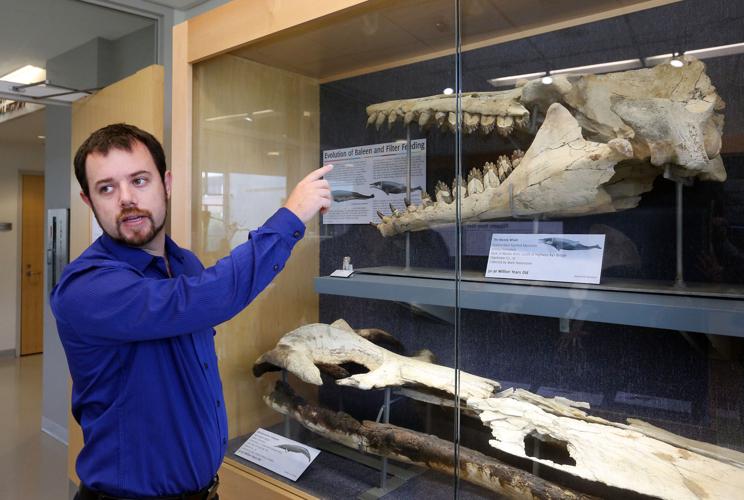A former College of Charleston paleontologist and his wife surrendered to campus police March 26 in connection with the theft of thousands of dollars worth of rare fossils that vanished from the school's Mace Brown Museum of Natural History, college officials said.
Robert Boessenecker, 38, faces a charge of grand larceny. He was booked into the Charleston County jail shortly after 9 a.m. along with his wife, Sarah Michalies, 37. She is charged with breach of trust, jail records show.
Both were released later in the morning after they each posted $2,500 bail, court records state.
The pair is implicated in the theft of $8,634 worth of fossils from the Calhoun Street museum where they worked. Campus police launched an investigation in early March after a rare dolphin jaw fossil was discovered to be missing from the museum's collection. Investigators later searched three locations tied to the couple and recovered more than 60 items belonging to the museum, according to arrest affidavits.
The couple voluntarily returned to Charleston from an out-of-state location to turn themselves in to police, said Sterling Chillico, Boessenecker's attorney. She said Boessenecker strongly maintains that all of the recovered items were "in his rightful possession" and that the allegations against him are false, stemming from "personal animosities and hidden agendas." She added that Boessenecker looks forward to clearing his name and preserving his professional reputation.
Boessenecker, who left the Mace Brown Museum in August 2023, is considered a rising star in the field of paleontology. He's made headlines by discovering new species of ancient sea creatures and appearing on Discovery Channel's Shark Week.
Boessenecker has also drawn attention for working alongside amateur fossil hunters, a group long scorned for keeping private the kinds of bones that belong in museums. While extending the olive branch to this community, he described multiple new marine mammal species from specimens collected by amateurs who brought them to the museum for long-term care and research.
One such specimen is now at the heart of the state's case against him.
Fossils vanish from Mace Brown Museum
According to police reports and arrest affidavits, the episode played out this way:
Lead curator Scott Persons contacted campus police on March 7 about a rare dolphin jaw fossil that former employees had taken from the Mace Brown Museum without permission or proper protocols. He described the jaw, with teeth still attached, as scientifically valuable and worth about $2,500 on the open market. Persons implicated Boessenecker and Michalies, the museum's previous collections manager, in the fossil's disappearance.
Persons told police that Boessenecker had returned the dolphin jaw to the fossil hunter who had donated it to the museum, along with paperwork documenting the gift. He allegedly told the donor that Michalies had "pulled a few strings" and, with the records gone, no one would be looking for it.
The tally of missing items grew as investigators began looking more closely at the couple.
Among the unaccounted items was a 3D printed whale skull, which a detective spotted in a photo on the website of Boessenecker's most recent employer, the Charleston Center for Paleontology in Mount Pleasant. Based on that find, campus police obtained warrants to search the center and Boessenecker's North Charleston home on Kellum Drive on March 14. They also searched a storage unit in Summerville tied to the couple a week later.
They discovered thousands of dollars worth of museum property in each location, authorities said.
Police found numerous items, including a box of dolphin skulls labeled "#64 skulls," as well as a Chewey-brand granola bar box "filled with fossils." The report describes a fossil in a box labeled "Bobby" that is believed to be property of the National Park Service. It contained a fossil from a previously unknown species that is "priceless scientifically."
Investigators also noted a box with Michalies' name and address on it, filled with more than $2,700 worth of petrified wood. The label on the box read: "Definitely not stolen mineral samples."
In addition to dozen of fossils, law enforcement confiscated numerous documents from Boessenecker's residence linked to the Mace Brown Museum, including information on fossil donations, as well as official fossil inventories, reports stated.
Charleston Center for Paleontology had no direct comment about Boessenecker's arrest. Elizabeth Kane, its founder and board chair, said only that the center continues to cooperate with police and the College of Charleston during the investigation.
College of Charleston officials also offered no comment on the arrests of Boessenecker and Michalies.
Boessenecker was a familiar face around the College of Charleston. His affiliation with the school's Department of Geology and Geosciences began in the fall of 2015. He's had many roles over the years, including research associate and visiting professor. Most recently, he served as one of the first research fellows at the Mace Brown Museum.
Notably, Boessenecker also had a personal relationship with Mace Brown, the museum's namesake. Brown created the museum in 2013 after donating over 1,500 fossils specimens, many of them rare, from his private collection, valued at over $1.6 million.
According to the college's website, the museum now has over 30,000 vertebrate and invertebrate specimens in its collection.
In May of last year, Boessenecker described two new species of whale previously unknown to science: Coronodon planifrons and Coronodon newtonorum. Both species were described using specimens in the Mace Brown Museum's collection; both were toothy creatures that once swam in the waters of modern day Charleston about 30 million years ago.
His interest in science communication landed him a role hosting a 2019 show on Discovery Channel's Shark Week, in which he took viewers on a California fossil hunt searching for the remains of megalodon and other sea monsters.















